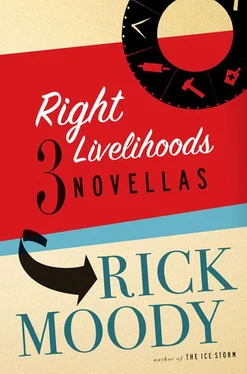Cassandra turned to me. “They want to know if you’re a good writer.”
“Uh, sure,” I said, answering to the room. “Sure. I guess. Uh, are you wanting me to write something? What do you have in mind exactly?”
More huddling. No amount of time was too lengthy, in terms of negotiation, and this was probably because time was no longer all that important to Cortez and the empire. All time present was now sucked up into the riptide of the past. Furthermore, since it was now possible that Eddie could disappear at any moment, like Addict Number One had, when someone else figured out his technique for dealing with the past, he had apparently deliberately moved to ensure an eternal boring instant where everybody looked the same and where nothing particularly happened. Events, any kind of events, were dangerous. Eddie’s fabled five mansions featured a languid, fixed now. He took his time. He changed his appearance frequently, as well as the appearance of all those around him. That way he could control memories. So his days were apparently taken up with dye jobs, false beards, colored contact lenses, with shopping for items relating to disguise and imposture and disfigurement.
A bike messenger goon addressed me directly on the subject of writing about Albertine.
“Funny you should, uh, suggest it,” I said. “Because I have been assigned to write a history, and that’s why I got in contact with Cassandra in the first place. . ”
Everyone looked at her. Faint traces of confusion.
Have I described her well enough? In the half light, she was a goddess, even though I figure addicts always shine in low lighting. In the emergency lighting of Eddie’s lair, Cassandra was the doomed forecaster, as her name implied. She was the whisperer of syllables in a tricky meter. She was the possibility of possibilities. I knew that desire for me must have been a thing that was slumbering for a really long time. It was just desire for desire, but now it was ungainly. I felt some stirring of possible futures with Cassandra, didn’t want to let her out of my sight. I was guilty of treating women like ideas in my search for Albertine. In fact, I knew so little about her that it was only just then that I thought about the fact that she was Asian too. From China, or maybe her parents or grandparents were from Hong Kong or Taiwan. Because now she swept back her black and maroon hair, and I could see her face. Her expression, which was kind of sad.
They all laughed. The bike messengers. I was the object of hilarity.
“Cassandra,” they said. “That’s a good one. What’s that, like some Chinese name?”
“You did good, girl. You’re a first-class bitch, Albertine, and so it’s time for a treat, if you want.”
A broadcaster’s voice. Like Eddie had managed to hire network talent to make his announcements.
“Wait,” I said. “Her name is. . ”
And then I got it. They named it after her.
“You named the drug after her?”
“Not necessarily,” the broadcasting voice said. “Might have named her after the drug. We can’t really remember the sequence. And the thing is, there are memories either way.”
“She doesn’t look like an Albertine to me.”
“The fuck you know, canary, ” the broadcaster said, and suddenly I heard Eddie in there, heard his attitude. Canary. A reporter’s nickname.
Cassandra was encircled by bike messengers and hefted up to a platform in the midst of the Rube Goldberg devices. Her rags were removed from her body by certain automated machines, prosthetic digits, and she was laid out like a sacrificial victim, which I guess is what she was, one knee bent, like in classical sculpture, one arm was stretched above her head. No woman is more poignant than the woman about to be sacrificed, but even this remark makes me more like Eddie, less like a lover.
“Your pleasure?” a bike messenger called out.
“Slave Owner, please,” said Cassandra.
“Good choice. Four horsepower, fifteen volts, three hundred fifty rpm.”
I covered my ears with my hands, and except for the glimpse of the steel bar that was meant to raise her ankles over her head, I saw no more — for the simple reason that I didn’t want to have to remember.
The bike messengers of the Cortez cartel had a different idea for me. I was led down a corridor to the shooting gallery. I was finally going to get my taste.
The guy holding my arms said, “Thing is, all employees got to submit to a mnemonic background check. . ”
A week or so before, I’d read a pamphlet by a specialist in medicinal applications of Albertine. There’s always a guy like this, right, a Dr. Feelgood, an apologist. He was on the Upper West Side, and his suggestion was that when getting high, one should always look carefully around the room and eliminate bad energies. Set and setting, in fact, were just as important with Albertine as with drugs in the hallucinogenic family:
If there’s any scientific validity at all to the theories of C. G. Jung and his followers, there’s genuine cause for worry when taking the drug known as Albertine. The reason for this is quite simply Jung’s concept known as
collective unconsciousness.
What do we mean when we invoke this theory? We mean that under certain extraordinary circumstances it is possible that memory, properly thought of as the exclusive domain of an Albertine effect, can occasionally collide with other areas of brain function. As Jung supposed, we each harbor a register of the simulacra that is part of being human. This fantasy register, it is said, can be the repository for symbolisms that are true across cultural and national lines. What kinds of images are these? Some of them are good, useful images, such as any representation of the divine: Christ as the Lamb of God, Buddha under the Bodhi tree, Shiva, with his many arms. Each of these is a useful area for meditation. However, images of the demonic are also collective, as with depictions of witches. The terrors of hell, in fact, have had a long collective history. Now it appears that certain modern phantasms — the CIA operative, the transnational terrorist — are both “real” and collective.
Therefore, we can suggest that casual users of Albertine make sure to observe some rules for their excursions. It’s important to know a little about whom you have with you at the time of ingestion. It’s important to know a little bit about their own circumstances. To put it another way, people you trust are a crucial part of any prolonged Albertine experience.
I suggest five easy steps to a rewarding experience with your memories: (1) Find a comfortable place; (2) Bring along a friend or loved one; (3) Use the drug
after
good meals or rewarding sexual experiences, so that you won’t waste all your time on the re-creation of these things; (4) Keep a photo album at hand, in case you want to draw your attention back to less harmful recollections; (5) Avoid horror films, heavy metal music, or anything with occult imagery.
The advice of the good doctor was ringing in my ears. No matter what happened to my city, no matter how many incarnations of boom and bust it went through — the go-go times, the Municipal Assistance Corporation — shooting galleries persisted in the Hot Zone and elsewhere. The exposed beams, the crumbling walls, the complete lack of electricity and heat, windows shattered, bodies lying around on mattresses. If it was important to know and trust the people with whom I was going to use, I was in some deep shit. Who wouldn’t dread coming here to this place of unwashed men, of human waste and dead bodies?
In the shadows, there was a guy with a stool and a metal folding table. I was motioned forward as the addict in front of me, an old hippie, collapsed onto the floor. Probably remembering the best night of sleep he ever had.
Читать дальше












